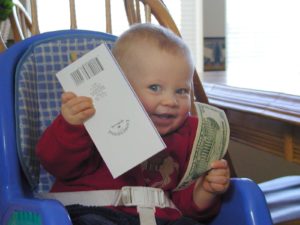What Can a Pre-Schooler Learn About Finances?

Baby with money
You may think your 2 – 5 year old child is way too young to start building a firm financial foundation, but there are many things they can and will learn as pre-schoolers, and you can give them a head start.
What money concepts CAN pre-schooler’s learn?
Based on my research for Grandma Rie’s Money Camp as well as my experience as a Mom and Grandma, I’ve found they can actually learn quite a bit. Here are some of the concepts I’ve found they can and do learn.
People trade to get good and services.
Kids understand money is medium of exchange – credit cards and checks work like money, and some stuff costs more than other stuff. After all, if they go to the store with you, they probably see you using all 3.
What you can do to help.
Children this age typically love imaginative play, so set up a pretend store, service station, restaurant or ice cream shop and play with them. Use pretend money, grab that toy cash register and shopping cart and take turns selling, servicing and shopping.
Start showing them your checkbook and checks. Take them to the bank (physically, they won’t understand online banking yet) and let them watch you cash a check.
Use a credit card when you pretend play and start telling them even at the early age, that you get billed later for using it.
I did all of the above when my grand-kids were just 3 and 5. We had a great time and it helped re-enforce the lessons they learned from their parents.
Identify coins and dollars.
Although they won’t understand the relative values of the coins or dollars, they do understand that they can trade them for that gumball in the machine or that candy bar at the counter. They can learn to name a penny, nickel, dime, quarter, and dollar (although they will call all denominations a dollar even if it is a fiver).
What you can do to help.
Build a money chart with them as an arts activity. Using poster board or other heavy paper, glue on coins and write what they are while talking about what that coin is. You can even start showing them that different coins have different values by making the chart show a nickel = followed by 5 pennies and etc.
Pre-schoolers can usually compare a few items and know that some are the same and some are different. Make a pile of change on the floor, with different values of coins mixed together and have them practice sorting the one pile into individual piles for each coin value.
They love, love, love repetition, so let them watch some Sesame Street You Tube video counting songs. My grand daughter drove me nearly to distraction playing this video over and over again when she was 3!
Count coins.
Pre-schoolers can usually count up to 10 by the age of 4 or so. Use coins to help them count.
What you can do to help.
Money and math are intertwined, as you teach math, use money! Here are some lesson plans from the Education Oasis for pre-schoolers to learn counting, sorting, patterning, matching, size order, uses of money.
Money is limited and can be used up.
Pre-schoolers begin to understand that sometimes they have to choose one thing over another and that things can be used up. Show them that the same thing holds true with money.
What can you do to help.
If you give your child a dollar or 5 to spend at the store, don’t bail him or her out if they want something that costs more. Let them learn that when it is gone, it is used up.
Last year, we took our kids and grandchildren to Yellowstone National Park. They were 4 and 7 years old at the time. One day, we gave the grand-kids a $20 account each to spend in the lodge gift stores. They already had learned the lesson that money can be used up. They shopped carefully in several stores before committing to purchases and both bought multiple items with their $20. As they bought each one, they consulted with us on ‘how much do I have left to spend?”. It was a surprising and revealing experience for us – and fun!
In your pretend play, you can also reinforce the concept by setting up rules of shopping and spending.
People earn money by working.
By ages 4 or 5, children can begin learning that people work. They will observe people all around them running businesses and doing jobs. You will talk about having to go to work.
What you can do to help.
Reinforce the concept that you go to work to earn money to buy groceries, etc. As you go about your weekly chores, if your child is along, point out the things people are doing and the businesses and services and products they are using to earn money.
Read to them. Books like the below all show different things people do to earn money.
- Busy Day Busy People by Tibor Gergely
- Tonka at the Auto Repair Center
- Richard Scarry’s Busiest Firefighters Ever
- Richard Scarry’s What Do People Do All Day?
My own children loved the Busy Day Busy people book. We read it over and over again. The grand-kids loved it as well.
What do you think pre-schoolers can learn about personal finance? How do you help yours learn those lessons?
Note: By clicking on the book links above you will go to Amazon.com. If you buy something we get a small commission which is used to help support this site.



